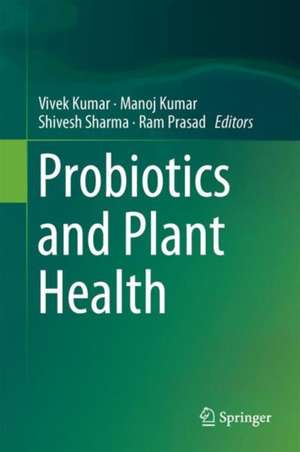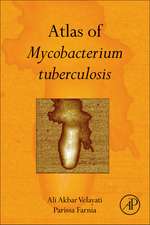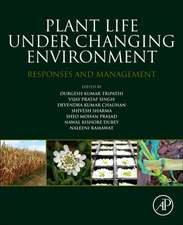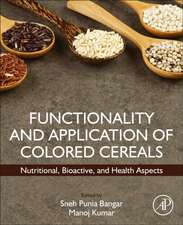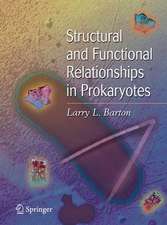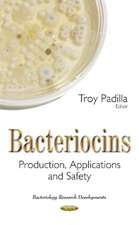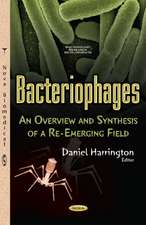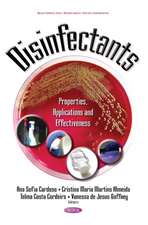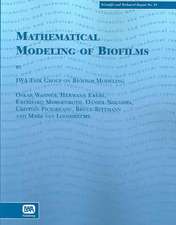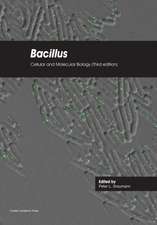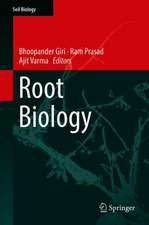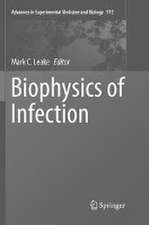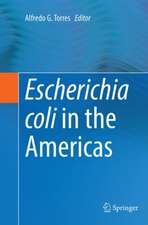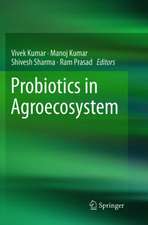Probiotics and Plant Health
Editat de Vivek Kumar, Manoj Kumar, Shivesh Sharma, Ram Prasaden Limba Engleză Hardback – 24 iul 2017
Despite the advances made in the study of plant-microbe synergism, the relation between microbes and plant health in the context of food security, soil nutrient management, human and plant health is still largely unexplored. Addressing that gap, the book presents reviews and original research articles that highlight the latest discoveries in plant probiotics, their specificity, diversity and function. Additional sections addressing nutrient management, human health, and plant microbiome management to improve plant productivity round out the coverage.
| Toate formatele și edițiile | Preț | Express |
|---|---|---|
| Paperback (1) | 1061.36 lei 38-44 zile | |
| Springer Nature Singapore – 12 mai 2018 | 1061.36 lei 38-44 zile | |
| Hardback (1) | 1079.33 lei 38-44 zile | |
| Springer Nature Singapore – 24 iul 2017 | 1079.33 lei 38-44 zile |
Preț: 1079.33 lei
Preț vechi: 1420.17 lei
-24% Nou
Puncte Express: 1619
Preț estimativ în valută:
206.56€ • 214.85$ • 170.52£
206.56€ • 214.85$ • 170.52£
Carte tipărită la comandă
Livrare economică 10-16 aprilie
Preluare comenzi: 021 569.72.76
Specificații
ISBN-13: 9789811034725
ISBN-10: 9811034729
Pagini: 688
Ilustrații: XI, 600 p. 56 illus., 50 illus. in color.
Dimensiuni: 155 x 235 mm
Greutate: 1.14 kg
Ediția:1st ed. 2017
Editura: Springer Nature Singapore
Colecția Springer
Locul publicării:Singapore, Singapore
ISBN-10: 9811034729
Pagini: 688
Ilustrații: XI, 600 p. 56 illus., 50 illus. in color.
Dimensiuni: 155 x 235 mm
Greutate: 1.14 kg
Ediția:1st ed. 2017
Editura: Springer Nature Singapore
Colecția Springer
Locul publicării:Singapore, Singapore
Cuprins
Phytostimulation and Biocontrol by the Plant-Associated Bacillus amyloliquefaciens FZB42 - An Update.- Management of Tomato Foot and Root Rot (TFRR) by Biocontrol Agents with Emphasis on Factors Affecting its Effectiveness.- Microbial Inoculants for Optimized Plant Nutrients Use in Integrated Pest and Input Management Systems.- The Legume Nodule Microbiome: A Source of Plant Growth Promoting Bacteria.- Plant Growth Promoting Microbes: Diverse Roles in Agriculture and Environmental Sustainability.- Phosphate Biofertilizers as Renewable and Safe Phosphorous Suppliers for Cropping Systems: A Review.- Bacterial Probiotics: A Truly Green Revolution.- Plant–Microbe Interactions in Adaptation of Agricultural Crops to Abiotic Stress Conditions.- Diversity and Efficiency of Rhizobia Nodulating Hedysarum flexuosum L. in Northwestern of Morocco in Relation to Soil Properties.- Increased Soil-Microbial-Eco-Physiological Interactions and Microbial Food Safety in Tomato under Organic Strategies.-Emerging Significance of Rhizospheric Probiotics and its Impact on Plant Health: Current Perspective towards Sustainable Agriculture.- The good, The Bad and The Ugly of Rhizosphere Microbiome.- Carriers and their Role in Plant Agro system.- Microbial Plant Probiotics: Problems in Application and Formulation.- Modulation of Plant Micronutrient Uptake by Arbuscular Mycorrhizal Fungi.- Efficacy of Probiotic Supplemented Vermicompost on Germination, Growth and Biochemical content of Vigna mungo (L.) Hepper.- Range of Microbial Disease-Complexes with Meloidogyne species and Role of Botanicals in Management.- Endophytic Probiotics and Plant Health- Towards a Balanced Accost.- Arbuscular Mycorrhizal Fungi (AMF) and Plant Growth Promoting Rhizobacteria (PGPR) Association in Potato (Solanum tuberosum L.)- A brief Review.- Microbial Biofertilizer Interventions in Augmenting Agroforestry.- 21) Effect of Biofertilizers on Biomass Yield and Quality of Ocimum basilicum L.- PGPR: Current Vogue in Sustainable Crop Production.- Application of Bioinoculants for Sustainable Agriculture.- Organic Farming, food quality and human health: A trisection of sustainability and a move from pesticides to ecofriendly biofertilizers.- Role of Trichoderma spp. for the Management of Soil-borne Fungal Pathogens.- Microbes as Biocontrol Agents.- Arbuscular Mycorrhizal Fungi for Sustainable Agriculture.- Microbial options for improved crop production.- Health implications of a plant beneficial and probiotic Lactobacillus casei in foods containing the isoflavone, Daidzein.
Notă biografică
Dr. Vivek Kumar is a scientist with involved in teaching, research and guidance, with a pledge to enduring knowledge. Dr. Kumar is working in the Institute of Microbial Technology at Amity University Uttar Pradesh, Noida, India. He obtained his masters and doctoral degree from CCS Haryana Agricultural University, Hisar, Haryana, India. He is serving in Editorial board of reputed international journals viz. Environment Asia, International Journal of Biological & Chemical Sciences, Journal of Advanced Botany and Zoology, Journal of Ecobiotechnology. He is also reviewer of Journal of Hazardous Materials, Science International, Acta Physiologiae Plantarum, Int. Research Journal of Plant Sciences, Int. J. Microbiology, African J Microbiology Research, Journal of Microbiology and Antimicrobials, Environment Science & Pollution Research, Rhizosphere. He has published 61 research papers, 19 book chapters, six review articles and two books. Dr. Kumar has also served as Microbiologist for eight years in Department of Soil and Water Research, Public Authority of Agricultural Affairs & Fish Resources, Kuwait. Dr. Kumar has organized number of conferences/workshops as convener/ organizing secretary.
Dr. Kumar’s research area are plant-microbe-interactions, environmental microbiology and bioremediation. He has been credited with first time reporting and identification of Pink Rot inflorescence disease of Date palm in Kuwait caused by Serratia marcescens. He has been awarded ‘Young Scientist Award’ for the year 2002 in ‘Agricultural Microbiology’ by the Association of Microbiologists of India (AMI).
Dr. Kumar is establishing an “unearthing and deliverance system”, where a balance is being strived between development of drought and salinity resistant microbiome for better crop production in rain fed and saline area. His teaching interests include General Microbiology, Environmental Microbiology/Biotechnology, Dairy microbiology and Bacteriology.< Dr. Manoj Kumar is a scientist with sanguine behavior who is adoring about research and development, with a commitment to lifelong learning. He is determined on high quality science that contributes broadly to both increasing intellectual knowledge of plant development and to increasing the ecological niche. He has a high level of professional desire and intellectual hunt, and the potential to fulfil the dream of his high impact publications and the future recognition of these by academic peers.
Dr. Kumar has pursued his PhD in Plant Biotechnology from prestigious Jawaharlal Nehru University and then awarded two postdocotoral fellowships consecutively: i) DBT-PDF from IISc Bangalore in 2005 and then NRF-PDF from University of Pretoria.
Dr. Manoj Kumar is a researcher of Plant Biotechnology in the Division of Microbial Technology at the Amity University Uttar Pradesh, India. Until recently, he was a coordinator of Bio-resource Chapter (Northern India) and served on editorial boards of five international journals. He referees for many more, including Phytoremediation, Journal of Soil Sediments and many more. The ultimate functional aim is to adapt crop plants in order to increase productivity and adaptability on such Indian soils, with consequent improvement of sustainability in both developed and developing countries. The ultimate intellectual aim is to understand the metabolic fate of microbial mediated precursors in whole plant physiology and genetics through processes occurring at the level of metabolism, particularly through processes rhizosphere communication under in situ and in vitro plants. This aim is being addressed by combining functional genetics and metagenomics approaches with a broad-based understanding of plant microbe healthy interaction.
Dr. Kumar’s research is the integration of microbial genetics with a breadth of plant physiological approaches to enable novel gene discovery and conferring metabolites. The development and use of process parameters for the study and manipulation of specific rare microbial types for sub-optimal soil conditions, and even in the broader areas of plant cultivation and characterization of its active bio-molecules for industry uses.
Dr. Kumar is establishing a “discovery and delivery pipeline”, where a balance is being strived between fundamental researches into molecular mechanisms of heavy metal resistance bacterial types on the delivery of those discoveries through the development of susceptible crops with improved abiotic (heavy metals-cobalt, zinc, cadmium) tolerance. In the heavy metal resistance gene research program, metagenomics and functional genomics approaches are being used to discover heavy metal resistance determinant on the transposon that affect traits that are likely to contribute to heavy metal tolerance. These genes i.e. czc (cobalt, zinc and cadmium resistance), and others discovered previously by other researchers, are being characterized to elucidate mechanisms of action and natural variation within the target crops / model testing crop (Arabidopsis thaliana), to a level necessary to facilitate resistancy. The research focuses on the alteration of genes likely to alter heavy metal tolerance in crop plants, and the testing of the effects of these alterations on overall biomass in the field. Work in definition can occur in parallel, as knowledge of some metal resistance conferring genes has primitive to the stage of molecular level, whereas discovery of fundamental processes is still required for such genes and traits.Dr. Shivesh Sharma is Associate professor and Head Department of Biotechnology at Motilal Nehru National Institute of Technology (MNNIT), Allahabad, Uttar Pradesh, India. Dr. Shivesh Sharma completed his Ph. D. in the field of Microbiology from Dr. RML Avadh University, Faizabad, Uttar Pradesh, India in the year 2001. He obtained his M.Sc. Microbiology from Chaudhary Sarwan Kumar Himachal Pradesh Krishi Vishvavidyalaya (CSKHPKV), Palampur, Himachal Pradesh, India. His research interests include Environmental Microbiology/Biotechnology, Plant Microbe interaction, and bioformulations. Before joining MNNIT, Allahabad in the year 2009, Dr. Shivesh Sharma has worked at S.B.S (PG) Institute of Biomedical Sciences and Research, Balawala, Dehradun Uttarakhand during 2002 to 2009. He has been involved in number of research projects funded both externally (DBT, UGC, DST, MHRD) and internally in the fields of his research interests. His teaching interests include Microbiology, Environmental Microbiology/Biotechnology, Food Biotechnology, Bacteriology and IPR.
He has successfully supervised 7 Ph.D. students, 8 M. Tech. Students and 28 M.Sc. students. He has 72 publications in research journals, 7 Book chapters to his name. He has edited/ authored a number of books. Dr. Shivesh Sharma has organized a number of conferences and Short Term Training Programs asconvener/ coordinator.Dr. Ram Prasad is Assistant Professor at the Amity Institute of Microbial Technology, Amity University, Uttar Pradesh, India. Dr. Prasad has completed his Ph.D. from the Department of Microbiology, Chaudhary Charan Singh University, Meerut, UP, India, in collaboration of School of Life Sciences, Jawaharlal Nehru University (JNU), New Delhi, India. Dr Prasad received his M.Sc. in Life Sciences at JNU and also qualified CSIR-NET, ASRB-NET, and GATE. His research interest includes plant-microbe-interactions, sustainable agriculture and microbial nanobiotechnology. Dr. Prasad has 93 publications to his credit, including research papers & book chapters and five patents issued or pending, and edited or authored several books. Dr. Prasad has eleven years of teaching experience and he has been awarded the Young Scientist Award (2007) and Prof. J.S. Datta Munshi Gold Medal (2009) by the International Society for Ecological Communications; FSAB fellowship (2010) by the Society for Applied Biotechnology; Outstanding Scientist Award (2015) in the field of Microbiology by Venus International Foundation; and the American Cancer Society UICC International Fellowship for Beginning Investigators (USA, 2014). In 2014-2015, Dr. Prasad served as Visiting Assistant Professor in the Department of Mechanical Engineering at Johns Hopkins University, USA.
Dr. Kumar’s research area are plant-microbe-interactions, environmental microbiology and bioremediation. He has been credited with first time reporting and identification of Pink Rot inflorescence disease of Date palm in Kuwait caused by Serratia marcescens. He has been awarded ‘Young Scientist Award’ for the year 2002 in ‘Agricultural Microbiology’ by the Association of Microbiologists of India (AMI).
Dr. Kumar is establishing an “unearthing and deliverance system”, where a balance is being strived between development of drought and salinity resistant microbiome for better crop production in rain fed and saline area. His teaching interests include General Microbiology, Environmental Microbiology/Biotechnology, Dairy microbiology and Bacteriology.< Dr. Manoj Kumar is a scientist with sanguine behavior who is adoring about research and development, with a commitment to lifelong learning. He is determined on high quality science that contributes broadly to both increasing intellectual knowledge of plant development and to increasing the ecological niche. He has a high level of professional desire and intellectual hunt, and the potential to fulfil the dream of his high impact publications and the future recognition of these by academic peers.
Dr. Kumar has pursued his PhD in Plant Biotechnology from prestigious Jawaharlal Nehru University and then awarded two postdocotoral fellowships consecutively: i) DBT-PDF from IISc Bangalore in 2005 and then NRF-PDF from University of Pretoria.
Dr. Manoj Kumar is a researcher of Plant Biotechnology in the Division of Microbial Technology at the Amity University Uttar Pradesh, India. Until recently, he was a coordinator of Bio-resource Chapter (Northern India) and served on editorial boards of five international journals. He referees for many more, including Phytoremediation, Journal of Soil Sediments and many more. The ultimate functional aim is to adapt crop plants in order to increase productivity and adaptability on such Indian soils, with consequent improvement of sustainability in both developed and developing countries. The ultimate intellectual aim is to understand the metabolic fate of microbial mediated precursors in whole plant physiology and genetics through processes occurring at the level of metabolism, particularly through processes rhizosphere communication under in situ and in vitro plants. This aim is being addressed by combining functional genetics and metagenomics approaches with a broad-based understanding of plant microbe healthy interaction.
Dr. Kumar’s research is the integration of microbial genetics with a breadth of plant physiological approaches to enable novel gene discovery and conferring metabolites. The development and use of process parameters for the study and manipulation of specific rare microbial types for sub-optimal soil conditions, and even in the broader areas of plant cultivation and characterization of its active bio-molecules for industry uses.
Dr. Kumar is establishing a “discovery and delivery pipeline”, where a balance is being strived between fundamental researches into molecular mechanisms of heavy metal resistance bacterial types on the delivery of those discoveries through the development of susceptible crops with improved abiotic (heavy metals-cobalt, zinc, cadmium) tolerance. In the heavy metal resistance gene research program, metagenomics and functional genomics approaches are being used to discover heavy metal resistance determinant on the transposon that affect traits that are likely to contribute to heavy metal tolerance. These genes i.e. czc (cobalt, zinc and cadmium resistance), and others discovered previously by other researchers, are being characterized to elucidate mechanisms of action and natural variation within the target crops / model testing crop (Arabidopsis thaliana), to a level necessary to facilitate resistancy. The research focuses on the alteration of genes likely to alter heavy metal tolerance in crop plants, and the testing of the effects of these alterations on overall biomass in the field. Work in definition can occur in parallel, as knowledge of some metal resistance conferring genes has primitive to the stage of molecular level, whereas discovery of fundamental processes is still required for such genes and traits.Dr. Shivesh Sharma is Associate professor and Head Department of Biotechnology at Motilal Nehru National Institute of Technology (MNNIT), Allahabad, Uttar Pradesh, India. Dr. Shivesh Sharma completed his Ph. D. in the field of Microbiology from Dr. RML Avadh University, Faizabad, Uttar Pradesh, India in the year 2001. He obtained his M.Sc. Microbiology from Chaudhary Sarwan Kumar Himachal Pradesh Krishi Vishvavidyalaya (CSKHPKV), Palampur, Himachal Pradesh, India. His research interests include Environmental Microbiology/Biotechnology, Plant Microbe interaction, and bioformulations. Before joining MNNIT, Allahabad in the year 2009, Dr. Shivesh Sharma has worked at S.B.S (PG) Institute of Biomedical Sciences and Research, Balawala, Dehradun Uttarakhand during 2002 to 2009. He has been involved in number of research projects funded both externally (DBT, UGC, DST, MHRD) and internally in the fields of his research interests. His teaching interests include Microbiology, Environmental Microbiology/Biotechnology, Food Biotechnology, Bacteriology and IPR.
He has successfully supervised 7 Ph.D. students, 8 M. Tech. Students and 28 M.Sc. students. He has 72 publications in research journals, 7 Book chapters to his name. He has edited/ authored a number of books. Dr. Shivesh Sharma has organized a number of conferences and Short Term Training Programs asconvener/ coordinator.Dr. Ram Prasad is Assistant Professor at the Amity Institute of Microbial Technology, Amity University, Uttar Pradesh, India. Dr. Prasad has completed his Ph.D. from the Department of Microbiology, Chaudhary Charan Singh University, Meerut, UP, India, in collaboration of School of Life Sciences, Jawaharlal Nehru University (JNU), New Delhi, India. Dr Prasad received his M.Sc. in Life Sciences at JNU and also qualified CSIR-NET, ASRB-NET, and GATE. His research interest includes plant-microbe-interactions, sustainable agriculture and microbial nanobiotechnology. Dr. Prasad has 93 publications to his credit, including research papers & book chapters and five patents issued or pending, and edited or authored several books. Dr. Prasad has eleven years of teaching experience and he has been awarded the Young Scientist Award (2007) and Prof. J.S. Datta Munshi Gold Medal (2009) by the International Society for Ecological Communications; FSAB fellowship (2010) by the Society for Applied Biotechnology; Outstanding Scientist Award (2015) in the field of Microbiology by Venus International Foundation; and the American Cancer Society UICC International Fellowship for Beginning Investigators (USA, 2014). In 2014-2015, Dr. Prasad served as Visiting Assistant Professor in the Department of Mechanical Engineering at Johns Hopkins University, USA.
Textul de pe ultima copertă
This book primarily focuses on microbial colonization, its role in plant growth and nutrient cycling, mycorrhizae, and providing an overview of phytospheric microorganisms in sustainable crop systems.
Despite the advances made in the study of plant-microbe synergism, the relation between microbes and plant health in the context of food security, soil nutrient management, human and plant health is still largely unexplored. Addressing that gap, the book presents reviews and original research articles that highlight the latest discoveries in plant probiotics, their specificity, diversity and function. Additional sections addressing nutrient management, human health, and plant microbiome management to improve plant productivity round out the coverage.
Despite the advances made in the study of plant-microbe synergism, the relation between microbes and plant health in the context of food security, soil nutrient management, human and plant health is still largely unexplored. Addressing that gap, the book presents reviews and original research articles that highlight the latest discoveries in plant probiotics, their specificity, diversity and function. Additional sections addressing nutrient management, human health, and plant microbiome management to improve plant productivity round out the coverage.
Caracteristici
Discusses in detail the plant probiotic microbes, their benefits on plant health and ultimately the implications on human health Provides additional chapters on plant-microbiome management to improve sustainability Explains difficult concepts with easy-to-comprehend diagrammatic representations Includes supplementary material: sn.pub/extras
